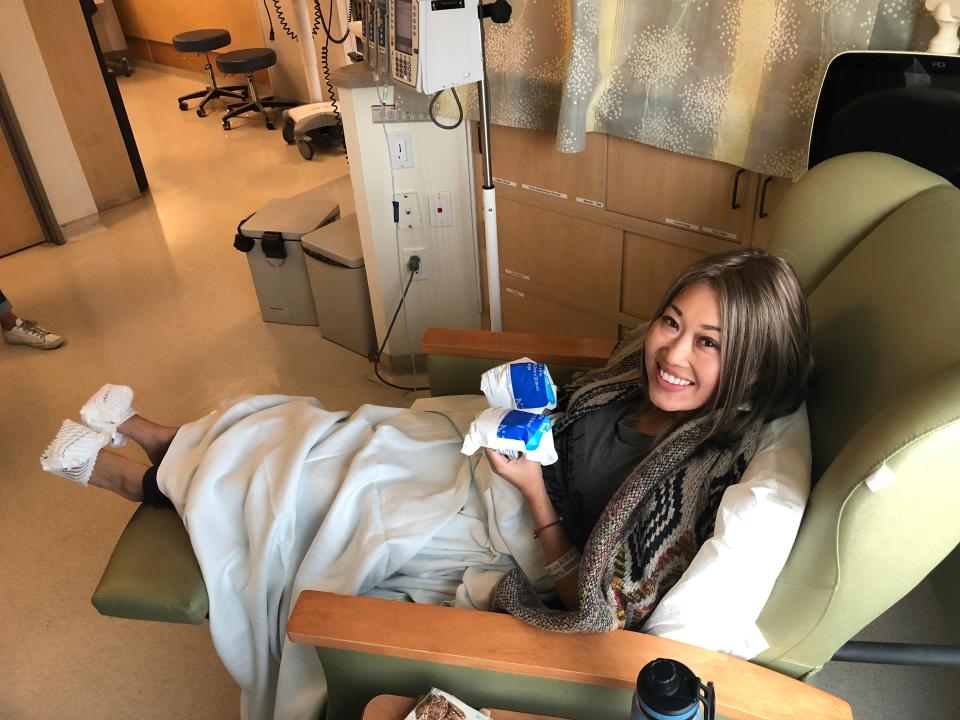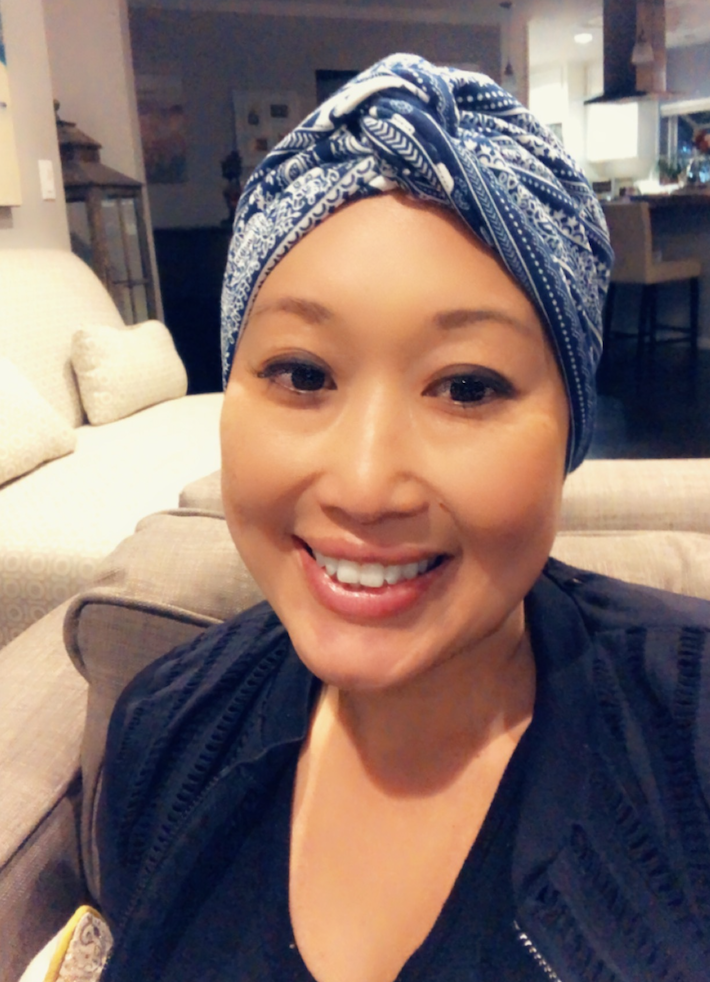I Was Diagnosed With Breast Cancer—Then Coronavirus Happened
Six months ago, I turned 40, had my first mammogram, and became one of the one in eight women who will be diagnosed with breast cancer in her lifetime. As those who know me can attest, I love a good challenge and I get shit done. So I looked at this new “challenge” and went to work, tracking down the best oncologist and surgical team I could find.
Then I started chemo, while continuing to work full-time and raise two kids. And while the four and a half months of chemo was grueling, I got through it, with lots of visits from supportive friends and the occasional conference call during an infusion. I lost my hair and gained some wigs, and I finished chemo on February 6. I waited a few weeks for my immunity to rebuild so my family could go to Hawaii to celebrate that milestone, before the next big hurdle—my double mastectomy with reconstruction, scheduled for March 20.
Vacation was supposed to be relaxing, but news started to filter in that COVID-19 was springing up in California, where we live. I messaged my surgeon after discovering one of the first patients in our area was receiving treatment at the same hospital where I was supposed to have my mastectomy. What are the chances? She assured me that my surgery was still on the books, and extra precautions were in place. Once we returned to California, schools had been canceled, orders to work from home were issued, and the great toilet paper shortage began. Friends and family asked whether I would delay my surgery, but I was determined to move forward. I wanted to get this cancer out of me ASAP, and as I was fearful the coronavirus would just get worse as time went on. Along with worrying that homeschooling my children would lead to their future demise, I was dealing with compromised immunity. I started to obsessively track the slightest sniffle or tickle in my throat—signs that I might have the virus. But as the days went on, it became clear that while physically I was fine, mentally I was a mess.
You want me to go home the same day? A drive-through mastectomy? No thanks!
Then I heard from my surgeon. She called and told me she wanted me to consider going home hours after the procedure to avoid exposure to the virus. I didn’t know how to respond. You want me to go home the same day? A drive-through mastectomy? No thanks! A double mastectomy is a major surgery, and I had planned to remain in the hospital to recover. But after talking to friends and experts, I came around. It would be better to wince through the pain on the drive home than risk catching the virus.
Because the hospital was on strict lockdown, I couldn’t have visitors. My surgery was for that Friday at 7 a.m., with a 5 a.m. arrival. A selfless friend picked me up and dropped me off like a five-star Uber driver; my husband stayed home with the kids. When I entered the hospital, I had a temperature check to ensure I didn’t have the virus and stored my bags. The next few hours were just paperwork, presurgical instructions, changing, and getting wheeled into the operating room. The nurses and doctors were telling me how quiet and eerie the hospital was; I was the only surgery they had scheduled since all nonessential surgeries were canceled. They were excited to have a “normal” patient, some action for the day. I’m glad I could help stave off their boredom! After making small talk and greeting my oncology surgeon and reconstructive surgeon, they asked what music I wanted to listen to. I remember saying whatever they wanted to put them in the mood for a good surgery.

Kannie-Yu-LaPack-chemotherapy-breast-cancer.jpg
The next thing I knew, I was in the recovery room, in an anesthetic haze. A recovery nurse gave me instructions on how to deal with the drains and a pain pump I’d been given, but I was not comprehending. She offered me ice chips, then water, then juice, then applesauce and crackers. And then she proceeded to tell me I had to eat something and use the restroom before they would “let” me go home. Let me go home? No part of me wanted to go home. I didn’t feel ready. I barely felt conscious. I fell asleep for a few hours, and when I woke up, the nurse again offered me juice, applesauce, and crackers. I felt like I was a toddler being force-fed. I said no, but I couldn’t convince her to stop until I…vomited all over her.
Another nurse (my angel) swooped in and saved me, promising I didn’t have to leave until I felt ready. I fell back asleep, and when I woke up two hours later, I could hear her speaking to my surgeon. I was, under no circumstances, to be admitted to stay overnight in the hospital; the risk of possible infection was just too great. My vitals were strong; I was just nauseated from the aftereffects of the drugs, so we made a plan. The outpatient wing closed at 8 p.m. I told her I would be ready to leave at 7:55 p.m.
At 7:55 p.m. on the dot, the waves of nausea raging, I was put into a wheelchair so that I could be wheeled to where my husband and children were waiting for me outside. (Again, no visitors inside, even to pick me up.) I vomited three more times before I even got to the exit, and asked the nurse if she really thought it was a good idea for me to leave. She told me that sleep was the most important thing for me to do right now and that the five-minute car ride home, however uncomfortable, was far more bearable than getting the virus for someone like me. So, with tears in my eyes, and holding on to my barf bag with actual barf inside it, we made it to the car. My kids were so excited to see me, but when they saw how terrible I looked, they started whimpering, telling me that they felt horrible for me and promising never to fight again. (Those liars—they started fighting the very next morning!) We made it home, as planned, in five minutes, and I went straight to bed.
When I woke up, my head felt clear again and all nausea was gone, but I still couldn’t do much without the help of my husband. I was, however, ecstatic to be home. My angel nurse checked in on me via text while my new nurse—my husband—really lived out his “in sickness and in health” end of the bargain, as he helped me with my medications, my drains, getting in and out of bed, and using the bathroom, all while caring for our kids.

Kannie-Yu-LaPack-turban-chemo-breast-cancer.jpg
By Sunday I could get myself in and out of bed and to the bathroom. By Monday I felt pretty good, other than having drains and wires all attached to me and feeling like Frankenstein's monster. On Monday night my surgeon called to tell me the pathology report came back—the lymph nodes tested negative and the chemo did its job.
While I’ll have to have another reconstruction surgery at some point in the future and will continue to get infusions of Herceptin every three weeks for a full year, I am so relieved I was able to have my double mastectomy as planned, even with a few bumps along the way. I know many other breast cancer patients haven’t been so lucky.
It’s a strange time to feel like you’re starting to heal when the news is plastered with people getting sick. I am so thankful for the surgeons, doctors, nurses, and technicians whose work continues during this vital time. They are on the front lines, putting themselves selflessly in the line of fire to ensure patients like me get the care they need to have a future to look forward to. I look back at how much has changed within me—and in the world—since my cancer diagnosis. What has helped me push through all the chaos of the past six months has been the power of positivity and a sense of gratitude. It’s served me well throughout, and now, more than ever, it will help me get through the global pandemic we are in now.
Kannie Yu LaPack is the SVP of publicity and public affairs at Lifetime.
Originally Appeared on Glamour

